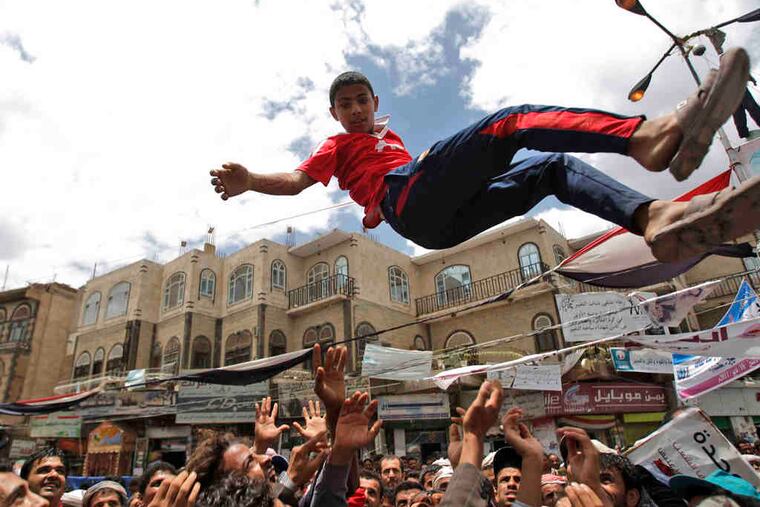Yemeni again says he will leave
SANA'A, Yemen - Under pressure from protesters and regional allies, Yemen's president said Saturday he would sign a deal to step down after 32 years in power. Still, he condemned the proposal as "a coup" and warned the United States and Europe that his departure would open the door for al-Qaeda to seize control of the fragile nation on the edge of Arabia.

SANA'A, Yemen - Under pressure from protesters and regional allies, Yemen's president said Saturday he would sign a deal to step down after 32 years in power. Still, he condemned the proposal as "a coup" and warned the United States and Europe that his departure would open the door for al-Qaeda to seize control of the fragile nation on the edge of Arabia.
The mixed signals from Yemen's embattled president, Ali Abdullah Saleh, followed two earlier promises from him that he would sign the proposal. Both times he backed away at the last minute, adding to the opposition's deep mistrust of a leader known for the adept political maneuvering that has kept him in power for decades.
In a sign that Saleh may be serious this time, the coalition of opposition political parties involved in the talks with Gulf Arab mediators was persuaded to sign the deal on Saturday, a day ahead of Saleh, based on what it said were guarantees that the president would follow through.
"We accept the initiative to stop bloodshed," Saleh said in a televised speech, and an official statement earlier in the day said he would sign the deal Sunday.
The proposal, mediated by a six-nation regional bloc called the Gulf Cooperation Council, grants him immunity from prosecution if he leaves office within 30 days. It is far from certain, however, whether it would satisfy all of the many groups protesting his rule.
Saleh has managed to cling to power in the face of near-daily street protests by hundreds of thousands of Yemenis fed up with corruption and poverty. Like other antigovernment movements sweeping the Arab world, they took inspiration from the popular uprisings in Tunisia and Egypt.
The president has vacillated among offering concessions, taking them back, and executing a violent crackdown that has killed more than 150 people, according to the opposition, which says it compiled the tally from lists of the dead at hospitals around the nation.
The bloodshed triggered a wave of defections by ruling party members, lawmakers, cabinet ministers, and senior diplomats. Saleh's own tribe has joined those demanding his ouster. Most important, several top army commanders, including a longtime confidant who heads a powerful armored division, joined the opposition and deployed their tanks in the streets of the capital, San'a, to protect the protesters.
Saleh has been able to survive thanks to the loyalty of Yemen's most highly trained and best-equipped military units, which are led by his close relatives.
That has raised concerns the political crisis could turn into armed clashes among the rival military forces if a deal is further delayed.
U.S. Secretary of State Hillary Rodham Clinton said Saturday that Yemenis had been suppressed throughout the country and innocent civilians had died.
"President Saleh needs to follow through on his commitment to transfer power," she said in a statement. "The government of Yemen must address the legitimate will of the people."